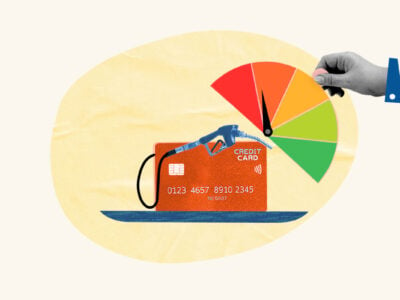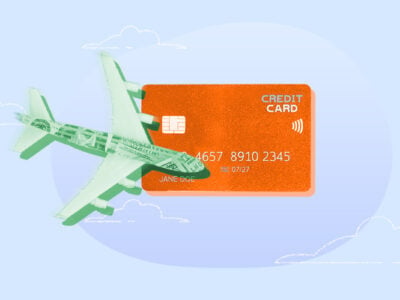Credit card issuers offer rewards on credit cards to incentivize borrowers to open new accounts, use their cards, and refer other customers to them. Credit card points are one of the most common types of rewards, but what exactly are they?
Learn more about what credit card points are, when you can earn them, and how they can be redeemed.
Table of Contents
What are credit card points?
Credit card points are one of the three main types of credit card rewards:
How do credit card points work?
You earn points—much like the other types of credit card rewards—when you use your card. You can then “redeem” them for a cash value.
Most cards offer a flat rewards rate for everyday purchases (for example, you might earn 1 point per $1 spent on your credit card). Additionally, many rewards cards offer special point rates for spending on specific types of purchases, such as:
- Dining
- Travel
- Gas
- Groceries
- Online shopping
- Memberships
Some credit card issuers have a fixed points system where you earn the same amount of points each time you make a purchase, while others have “bonus categories” where they offer greater rewards rate for certain purchases at certain times.
For example, you may regularly earn 2 points per $1 spent on a credit card, but 5 points per $1 spent on dining in the month of March. While rotating category point structures take more effort to track and get the most out of, they tend to offer the most generous rewards rates.
Once you’ve earned a certain number of points, you can redeem them in a variety of ways for a specific cash value. How and when you can redeem points will vary based on the credit card. Points are often redeemed for things like:
- Travel
- Statement credit
- Cash
- Gift cards
- Events
- Discounts
- Donations
Do credit card points expire?
Credit card points can expire, depending on the card issuer. This is common among store rewards cards (branded cards offering rewards for shopping at a specific franchise) and travel cards. For example, airline or hotel cards may list dates by which you must use your points.
Always check the cardholder agreement before applying to a specific credit card, so you know whether the points can expire.
How to earn credit card points
There are a lot of different ways to earn credit card points. Below are some of the most common ones:
- Daily purchases: Many rewards credit cards give you points for every dollar you spend on your daily purchases. This is probably the most typical method of earning points.
- Bonus category spending: Some issuers offer extra points for making purchases in bonus categories. Sometimes bonus categories are constant, while other cards may have rotating bonus categories.
- Sign-up bonuses: Many credit card issuers offer a sign-up bonus that allows you to earn a large number of points upon or shortly after opening your credit card account. However, you may have to meet a spending minimum within the first three to six months of opening the card before you can claim the bonus.
- Referral bonuses: You may be able to earn extra points for bringing your card issuers new customers. The number of points you can earn by referring a friend will depend on the issuer. Additionally, referral bonuses may be offered just for getting someone to apply, or they may depend on whether your referral gets approved for the card.
- Authorized user bonuses: Some issuers give you points for adding an authorized user to your card. Furthermore, you can rack up double the points if your authorized user is also making frequent purchases on the card. Just bear in mind that the user is not legally obligated to make their payments, and you’re responsible for the charges they make if they fail to pay.
- Milestone rewards: Some card issuers give you bonus points to celebrate your card’s anniversary, while others may reward you for making a certain number of purchases per month, or for spending a certain amount in a year. Milestone points vary between issuers.
How much is a credit card point worth?
Credit card points are typically valued at 1 cent per point. However, this can vary depending on both the credit card issuer and what you spend the points on.
For example, some cards may offer lower cash value for points redeemed as statement credit, or higher cash value for points redeemed for discounts at certain stores.
How much are 1,000 points worth?
Although reward rates vary with different credit cards, if you use the general 1 cent per point calculation, 1,000 points are worth $10.
How to calculate credit card point value
The equation to calculate your credit card point value is as follows:
Point value = Dollar value of reward / points needed to redeem it
For example, if you can purchase a $300 flight with 15,000 points, your points are worth 2 cents (because 300 / 15,000 is 0.02).
How credit point values can change
Credit card points, like miles, can be devalued. This is because credit card issuers are entitled to change their point system anytime, meaning they can suddenly lower the value of a point or require more points for a given item.
To protect yourself from point devaluation and missing out on rewards, you should redeem your rewards often.
How to redeem credit card points
Generally, you can redeem your points by logging into your online account and navigating to the rewards section. Alternatively, some credit card issuers may have a separate website for rewards redemption, and some may let you redeem your rewards directly through third-party sites like Amazon or Uber.
Below are some common ways you can redeem credit card points:
- Cash back: You may be able to redeem your points as cash, often issued as a check in the mail.
- Statement credit: If you redeem points as statement credit, your issuer will deposit the cash value of the redeemed rewards points directly into your credit account, lowering your outstanding balance by that amount.
- Travel: If you have a travel rewards card, you can redeem your points for airfare, hotel stays, cruises, and other travel-related purchases.
- Merchandise: Some issuers allow you to use your points directly for online shopping. You can spend your points on purchases like electronics, kitchenware, or clothes online.
- Loyalty programs: Your card may let you transfer your rewards points to travel loyalty programs you’re part of, turning your credit card points into hotel points or airline miles.
- Third-party sites: Some issuers allow you to redeem your points through a third-party site, like Amazon or Uber. This means your points could cover your Amazon purchases or Uber expenses.
- Gift cards: Many cards allow you to trade points for gift cards to various retailers. Most major credit card companies have deals with certain retailers and offer full-value or higher-value points if redeemed as a partnering retailer’s gift card.
- Charity: Some cards let you donate your points to a charitable organization. However, your points likely won’t be worth as much as if you redeemed your rewards for cash back and managed the donation on your own.
Are credit card points worth it?
Credit card points are worth it if you can make the most of the rewards and manage your spending responsibly. However, credit card points are not worth it if you:
- Change your spending habits to get points: If you’re spending money you wouldn’t otherwise have spent just to rake in credit card points, you’re likely losing more money than you’re saving with your points card.
- Pay more in fees than you earn back: If you’re charged a high annual fee on a credit card for the sake of a good rewards program, it may not be worth it if you aren’t getting more value in cash back than you pay annually.
When choosing a rewards card, consider the type of bonus rewards your issuer offers and see which aligns best with your lifestyle and spending habits. You want to choose a card that gives you the most rewards on purchases you regularly make. For example, if you rarely travel, you should probably write off miles rewards cards in favor of points or cash back.
As you’re probably gathering, some credit cards, especially rewards cards, charge an annual fee. Take this into consideration when shopping for a card, and choose one that offers more value in rewards than what you need to spend to keep the card open.






